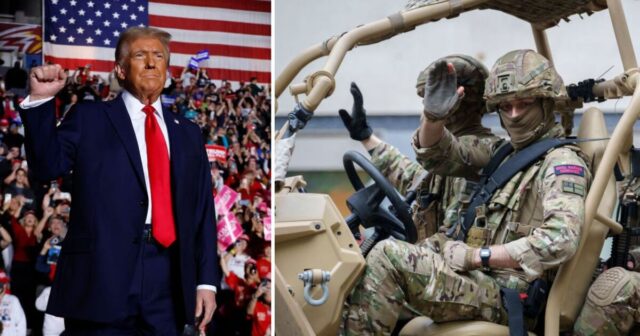Much has already been written about how the election of Donald J Trump to the White House for a second Presidential term might affect US support to both Ukraine and Israel.
Equally significant, however, is the potential effect his administration’s foreign policy might have on the defence postures of European nations in general and on the UK’s in particular.
In his first term in office Trump was vocal in his criticism of what he saw as Europe’s reluctance to pull its weight in sharing the defence burden in NATO. At one point he even threatened to pull the USA out of the Alliance altogether.
At that time few NATO members were meeting the NATO benchmark of spending 2% of their GDP on defence. Today the majority of NATO members have stepped up to the plate and have reached, or breached, the 2% threshold.
Britain currently achieves roughly 2.3%, but that figure is inflated by all sorts of skulduggery like including military pensions and aid to Ukraine.
But however you look at it the UK is going to have to up its game in terms of defence spending. The Labour administration may have pledged an increase to 2.5% of GDP “when circumstances allow” but Trump may remove their luxury of choosing when that might be.
Most credible British military commentators think it should be upped to 3% right away, and some are calling for 5%. The woeful state of Britain’s Armed Forces are well documented elsewhere and there’s no need to repeat that sorry tale here.
Suffice to say that the Royal Navy cannot crew all is ships due too its lack of matelots, the Army would be hard pressed to but one brigade into the field without a major effort, and the RAF is about 200 trained pilots short by some estimates.
This is not a good look and does not fill our allies with confidence. Senior US military figures are on record as saying that the UK can no longer be regarded as a first tier military power. And they’re meant to be our staunchest allies.
The bottom line is that Sir Keir Starmer and his gang have got to prioritise defence over all other government demands or else risk withdrawal of US military support. And the problem is that Labour is all at sea when it comes to defence, the well-meaning offices of Defence Secretary John Healey notwithstanding.
Our Armed Forces case should be championed by the current Chief of the Defence Staff (CDS), Admiral Sir Tony Radikin, but he’s turning out to be a bit of a wet tea towel and unquestioning government shill. Perhaps he has one eye on the House of Lords and doesn’t want to rock the boat – who knows?
I would say he needs to speak out or ship out, making way for another who is made of sterner stuff. But does such an individual exist in British military circles?
A further complication is the Strategic Defence Review (SDR) currently underway under the auspices of former Labour Defence Secretary and NATO Secretary General Lord (George) Robertson. Despite him having been incredibly rude about me in a previous existence I reckon he is the right many for the job.
However, Trump’s imminent accession might put the kibosh on Robertson’s freedom of manoeuvre. An SDR is usually politics-speak for defence cuts, but if the USA puts demands on the UK’s defence policy spending then our George and his team might have to think again.
The problem with most wars is that they tend to come along when you least want them (not that anyone sane really ever wants them), plus you enter them not with what you’d like to have in your inventory but with what you have. In the UK’s case that’s quite clearly not enough at present, but you can’t just turn the tap on and reconstitute your Armed Forces overnight.
It takes years if not decades.
So, there’s the Starmer government’s dilemma; how to we reconstitute Britain’s Armed Forces at an affordable outlay without hacking off the incoming Trump administration that the UK is not doing enough?
The trite answer is more money, and that money to be spent more wisely. Turning around a sclerotic defence establishment and MoD is a major challenge though. There are too many vested interests, not the least of which is the revolving door between senior government defence appointments and the defence industry, which in the UK relies on the old boys’ network to secure lucrative MoD contracts.
Sort that out and we’ll be half way there. I have been banging this particular drum for at least 20 years now and nobody has taken a blind bit of interest. And I don’t think they will to this particular article either, but I haven’t given up yet!
Lt Col Stuart Crawford is a political and defence commentator and former army officer. Sign up for his podcasts and newsletters at www.DefenceReview.uk





